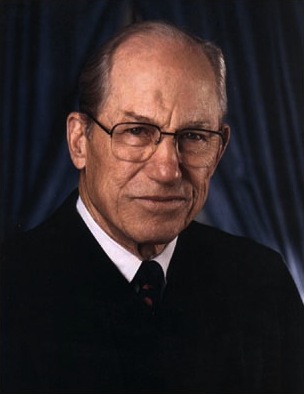
Byron White
Byron Raymond "Whizzer" White (June 8, 1917 – April 15, 2002) was an American lawyer, jurist, and professional football player who served as an associate justice of the Supreme Court of the United States from 1962 until 1993. By his retirement, he was its only sitting Democrat and the last-living member of the progressive Warren Court.
This article is about the Supreme Court Justice and former football player. For the sailor, see Byron White (sailor).
Byron White
April 15, 2002 (aged 84)
Denver, Colorado, U.S.
Clayton Sam White (brother)
1942–1945
![]() Bronze Star (2)
Bronze Star (2)
6 ft 1 in (1.85 m)
187 lb (85 kg)
Colorado (1935–1937)
1938 / Round: 1 / Pick: 4
1,321
1,321
3.4
11
16
301
1
Born and raised in a small homestead in Wellington, Colorado, White distinguished himself as a student athlete who came from a background of poor farmhands to become a consensus All-American halfback for the Colorado Buffaloes. After being the runner-up for the Heisman Trophy in 1937, he was selected in the 1938 NFL Draft by the Pittsburgh Pirates for the National Football League (NFL). He led the league in rushing yards during his rookie season. White graduated from the University of Colorado Boulder as class valedictorian, attaining a Rhodes Scholarship to study at Oxford University. After World War II forced him to return to the United States, he matriculated at Yale Law School, played for the Detroit Lions in the 1940 and 1941 seasons while still enrolled, and served as an officer for the United States Navy in the Pacific Theatre.
White graduated from law school with honors in 1946 and clerked for Chief Justice Fred M. Vinson. He eschewed work for a white-shoe firm and returned to Colorado in order to enter private practice in Denver as a transactional attorney. Minor work as the Colorado state chair of John F. Kennedy's 1960 presidential campaign led to him being unexpectedly tapped in 1961 for a position as U.S. Deputy Attorney General. He was successfully nominated by Kennedy to the Supreme Court the next year, becoming the Court's first justice from Colorado.
White espoused a pragmatic and non-doctrinaire judicial approach which strengthened the powers of the federal government, advocated for the desegregation of public schools, and upheld the use of affirmative action. Though expected to be a reliably liberal justice, he was by contrast a vociferous opponent of substantive due process, penning dissents in both Miranda v. Arizona and Roe v. Wade. White wrote the majority opinion in Bowers v. Hardwick (upholding the ability for states to restrict homosexual conduct) and dissented in Runyon v. McCrary (against the ability for the government to restrict racial discrimination in private schools) and Planned Parenthood v. Casey. Due to his unwillingness to align with either the liberal or conservative blocs, White was largely orientated with the Court's center.[1]
Later years and death[edit]
After retiring from the Supreme Court, White occasionally sat with lower federal courts.[11] He maintained chambers in the federal courthouse in Denver until shortly before his death.[76] He also served for the Commission on Structural Alternatives for the Federal Courts of Appeals.[77]
White died of pneumonia on April 15, 2002, at the age of 84.[78] He was the last living Justice to have served on the Warren Court,[76][79] and the last justice appointed by Kennedy;[80] he died the day before the fortieth anniversary of his swearing in as a Justice. From his death until the retirement of Sandra Day O'Connor in 2006, there were no living former justices.[11]
His remains are interred at All Souls Walk at St. John's Cathedral in Denver.[81]
Then-Chief Justice Rehnquist said White "came as close as anyone I have known to meriting Matthew Arnold's description of Sophocles: 'He saw life steadily and he saw it whole.' All of us who served with him will miss him."[82]
Personal life[edit]
White first met his wife Marion Stearns (1921–2009), the daughter of the president of the University of Colorado, when she was in high school and he was a college football player.[83] During World War II, Marion served in the WAVES while her future husband was a Navy intelligence officer. They married in 1946 and had two children: a son named Charles Byron (Barney) and a daughter named Nancy.[11]
His older brother Clayton Samuel "Sam" White (1912–2004) was also a high school valedictorian and Rhodes Scholar. He later became a physician and medical researcher, particularly on the effects of atomic bomb blasts.[9]


